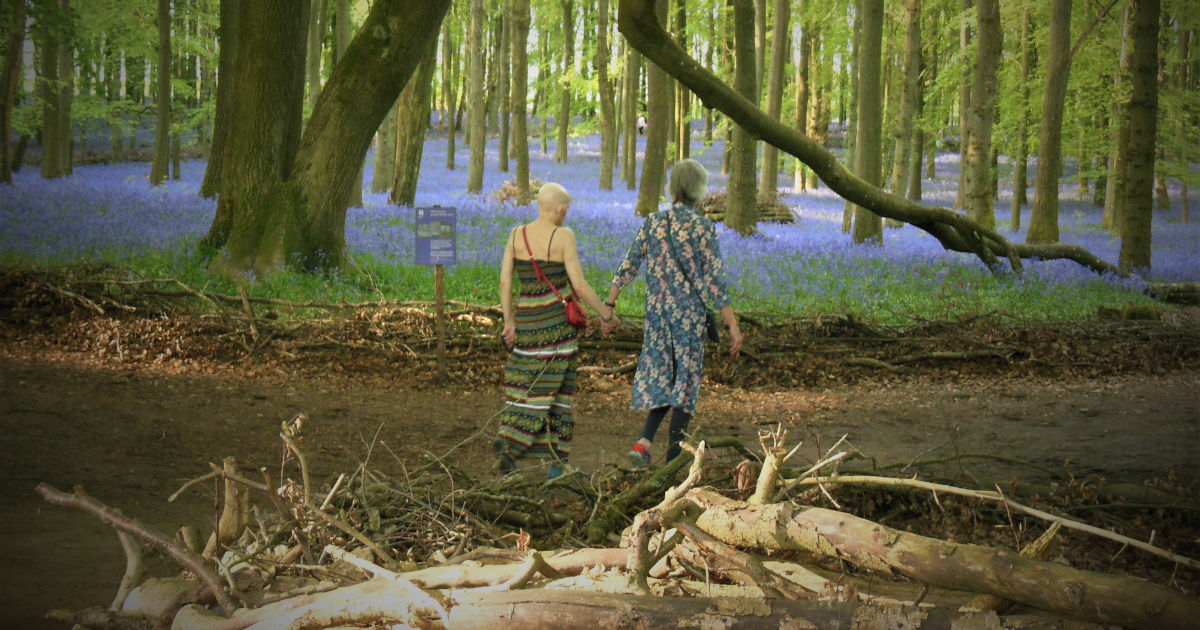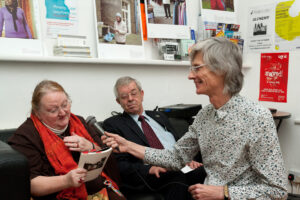
LISA DART – SURVIVAL POETRY AND THE VOICES OF EXPERIENCE
I interviewed Lisa Dart, finalist in the Grolier, Aesthetica and Troubadour Poetry Prizes and author of The Linguistics of Light (poems, Salt, 2008), Fathom (prose

 I’ve noticed, watching TV talent shows, how many helpers are needed for someone to learn an expressive art or a practical skill. So the celebs in Strictly Come Dancing get hours of teaching and encouragement from their professional partners. And the singers in The Voice have families who book and ferry them to gigs, deal with equipment and cheer them on. My wife, children’s author Sue Hampton, had the same: a wonderfully enthusiastic English teacher who developed her love of literature and a dad who took her to plays and art galleries. These supporters set personal examples as well. So Sue learned the value of redrafting from seeing her dad repeatedly rewriting his poems and the admiring celebs often take on the professional dancers’ impressive work ethic.
I’ve noticed, watching TV talent shows, how many helpers are needed for someone to learn an expressive art or a practical skill. So the celebs in Strictly Come Dancing get hours of teaching and encouragement from their professional partners. And the singers in The Voice have families who book and ferry them to gigs, deal with equipment and cheer them on. My wife, children’s author Sue Hampton, had the same: a wonderfully enthusiastic English teacher who developed her love of literature and a dad who took her to plays and art galleries. These supporters set personal examples as well. So Sue learned the value of redrafting from seeing her dad repeatedly rewriting his poems and the admiring celebs often take on the professional dancers’ impressive work ethic.
A lot of practical skills come from working with someone who gives you tips about what to do when this or that happens. This hands-on, experiential approach works well with learning to play an instrument, controlling a ball or fixing a computer. An expert who also knows what it’s like to start from scratch – and shows it – can help to build up your skill, step by step. I remember my piano teacher, John, who got me to practise a piece in bite-sized chunks, repeating each phrase until it became automatic then running the whole thing together. He told me to start off practising a phrase very slowly, to avoid any mistakes, and speed up later. His point was that if you rushed it and introduced an error you’d have to erase it by repeating the correct pattern, several times. He reckoned that every error took about four undos.
‘Don’t rush it’ is a good rule for learning anything from typing to DIY. In writing, my experience is that if you set yourself a high word target for the day, by the time you reach it you may have got side-tracked or introduced dozens of clichés. I prefer to edit as I go, and reread. Even then I may have to go back and begin again from an earlier point, before I lost the thread. Like Rothko’s paintings, writing is layered: it’s a question of knowing where to strip back, where to build up and where to stop.
The problem with my piano teacher’s approach was its defensive nature, guarding against errors and not allowing for joy, feel or interpretation. That’s why the Suzuki violin method teaches children to listen and enjoy music, as well as the correct hold on bow and instrument.
As a teacher I always found that to work through a student’s strengths was more effective than finding fault. But there does come a point, as expertise increases, where ruthless self-criticism sets in. At this stage it’s no good fooling yourself something’s wonderful when it’s OK-ish. So top football teams are driven by players scrutinising each other’s moves and demanding high standards, which can make dressing rooms very tough places to be! Keeping morale up can be difficult in these circumstances, so these teams sometimes implode. But the highs when the obsessive criticism pays off are huge.
In the end we’re a sociable species. It’s all those helpers with their practical and emotional support who make the performance possible. But you have to keep your feet on the ground. In The Chimp Paradox Prof Steve Peters suggests that in every group of five you’ll find one person who will give you unconditional support, one who will never understand you and three who will be more fair-minded and balanced. In my view The Chimp Paradox is too focussed on head over heart, but it helped the British cycle team sweep the board at the Olympics!
My advice to anyone trying to improve their creative work is to listen politely and ignore a) people who jump in with how they would have done it b) the odd nit-picker who uses a single fault to dismiss the lot c) the middle-of-the-road people who claim ‘It’s all a matter of taste’. I’d say, look for a critic who understands from the inside what you’re attempting and can suggest improvements. That person, and the unconditional helpers, are the people who make original work possible.
ABOUT LESLIE TATE’S BOOKS:

I interviewed Lisa Dart, finalist in the Grolier, Aesthetica and Troubadour Poetry Prizes and author of The Linguistics of Light (poems, Salt, 2008), Fathom (prose

I interviewed writer Julia Lee Barclay-Morton about her experience of autism. Julia began as an experimental dramatist in New York, moving to the UK to

I interviewed Gillean McDougall from Glasgow, who edited the collaborative projects Honest Error (on Charles Rennie Mackintosh and his wife Margaret Macdonald) and Writing the

I interviewed French writer Delphine de Vigan, whose book, No et moi, won the prestigious Prix des libraires. Other books of hers have won a clutch

I interviewed Joanne Limburg whose poetry collection Feminismo was shortlisted for the Forward Prize for Best First Collection; another collection, Paraphernalia, was a Poetry Book Society Recommendation. Joanne
| Cookie | Duration | Description |
|---|---|---|
| cookielawinfo-checkbox-analytics | 11 months | This cookie is set by GDPR Cookie Consent plugin. The cookie is used to store the user consent for the cookies in the category "Analytics". |
| cookielawinfo-checkbox-functional | 11 months | The cookie is set by GDPR cookie consent to record the user consent for the cookies in the category "Functional". |
| cookielawinfo-checkbox-necessary | 11 months | This cookie is set by GDPR Cookie Consent plugin. The cookies is used to store the user consent for the cookies in the category "Necessary". |
| cookielawinfo-checkbox-others | 11 months | This cookie is set by GDPR Cookie Consent plugin. The cookie is used to store the user consent for the cookies in the category "Other. |
| cookielawinfo-checkbox-performance | 11 months | This cookie is set by GDPR Cookie Consent plugin. The cookie is used to store the user consent for the cookies in the category "Performance". |
| viewed_cookie_policy | 11 months | The cookie is set by the GDPR Cookie Consent plugin and is used to store whether or not user has consented to the use of cookies. It does not store any personal data. |
One Response
A very thoughtful , very emotional. very inspirational and deeply honest writing! Thank you!